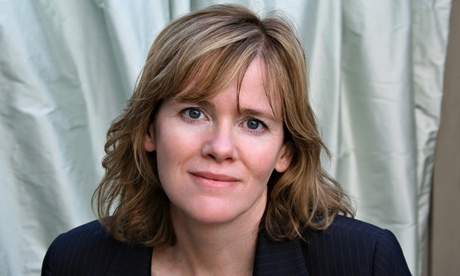
This One Is Mine is Maria Semple's first novel, the book she published before her funny, dark, tender hit, Where'd You Go, Bernadette When it came out in the US in 2008, sales were pretty dismal; obscurity beckoned. But now it has a second chance, in the UK at least, having been neatly repackaged in a familiar stylised cover that calls the Orange prize shortlisted Bernadette instantly to mind. I predict that in the coming weeks an awful lot of people are going to rush out and buy it in the hope that Semple's "new" heroine, Violet Parry, makes them feel every bit as giddy as her predecessors, Bernadette Fox and her sassy daughter, Bee.
Will they be disappointed? Almost certainly. It's not that This One Is Mine isn't enjoyable because it often is: a couple of its set pieces – a trip to a parenting class, an extreme yoga weekend – had me snorting into my tea. But it never comes close to reaching the singular heights of Bernadette, a gloriously wacky and freewheeling narrative whose form embraces emails, school report cards and even TED talks. This One Is Mine is told in the traditional third person and relies, sometimes rather heavily, on flashback and interior monologue. Its plot tends towards implausibility, its characters are too one-dimensional to be taken to heart by the reader, for all that Semple works hard to give them their share of funny lines. Its setting, too, is problematic. This is privileged Los Angeles, a world of TV stars, music promoters and fundraiser wives, and while every physical detail feels true – Semple, who used to be an LA comedy writer, knows all about these people's shopping habits – nothing is ever really at stake. Its most important characters can always buy their way out of trouble. As novels go, this one really wants for jeopardy.
Violet Parry, an ex-scriptwriter, is rich. She lives in an architecturally significant house in the Hollywood Hills with her husband David, a manager of rock bands, and her darling toddler, Dot. She has staff, a running account at Hermès, and access to as much tofu and Parisian confectionery as she can eat. But she's also bored. Motherhood has changed her body, and distanced her from her marriage. She feels fat and sexless. Until, that is, she claps eyes on Teddy Reyes, an impoverished musician and recovering addict, at which point she descends into a sexual obsession so loopy and so futile – there really is nothing she won't do for this man – that the elasticated waistband of her trousers suddenly worries her no more.
What follows is mostly farce, as Violet merrily debases herself over and over again, and all the while desperately tries to avoid discovery by David. Running alongside this is the story of David's diabetic sister, Sally, whose medical bills he has paid ever since he can remember. Sally is one of those people who's always on the edge of hysteria, which is, perhaps, part of the reason why her last relationship – with a Buddhist shoe salesman – came to nothing. Now, though, she has a new quarry: a sports statistician who is about to hit the big time (he has just won a TV gig). Jeremy is odd – the reader works out why he is odd almost immediately – but Sally cares not a jot. She will have him! Again, what follows is mostly farce. Their wedding, financed by David and choreographed by Violet, goes wildly, fantastically wrong, the chaos beginning with the premature demolition of a mountain of sugar-free cupcakes, and ending with Sally forgetting to take her insulin.
Will Sally and Jeremy's marriage last? Will Violet and David's? And what is to become of Teddy Reyes? At this point, the reader will perhaps answer: who cares? Sally is so grasping and so very dumb, she surely deserves to lose her new husband as fast as she bagged him. David, having worked through his anger with Violet in a ridiculous sweat lodge ceremony, is clearly destined to wait for his ridiculous wife to come to her senses (he, by the way, is a far more interesting character than Violet, his ruthless pragmatism more expertly drawn than her ennui). As for Reyes, he's so sleazy, duplicitous and physically repulsive – even Violet has moments of clarity when she is repulsed by his greasy hair, bad teeth and sex addiction – it's almost impossible to feel any sympathy for him. As the action moved frantically to a resolution, I must admit that I turned the book's pages ever more listlessly. But, again: who cares? This is a first novel, one whose successor turned out to be a comic triumph. Like David with Violet's credit card bills, I read it in a spirit of great forgiveness.

